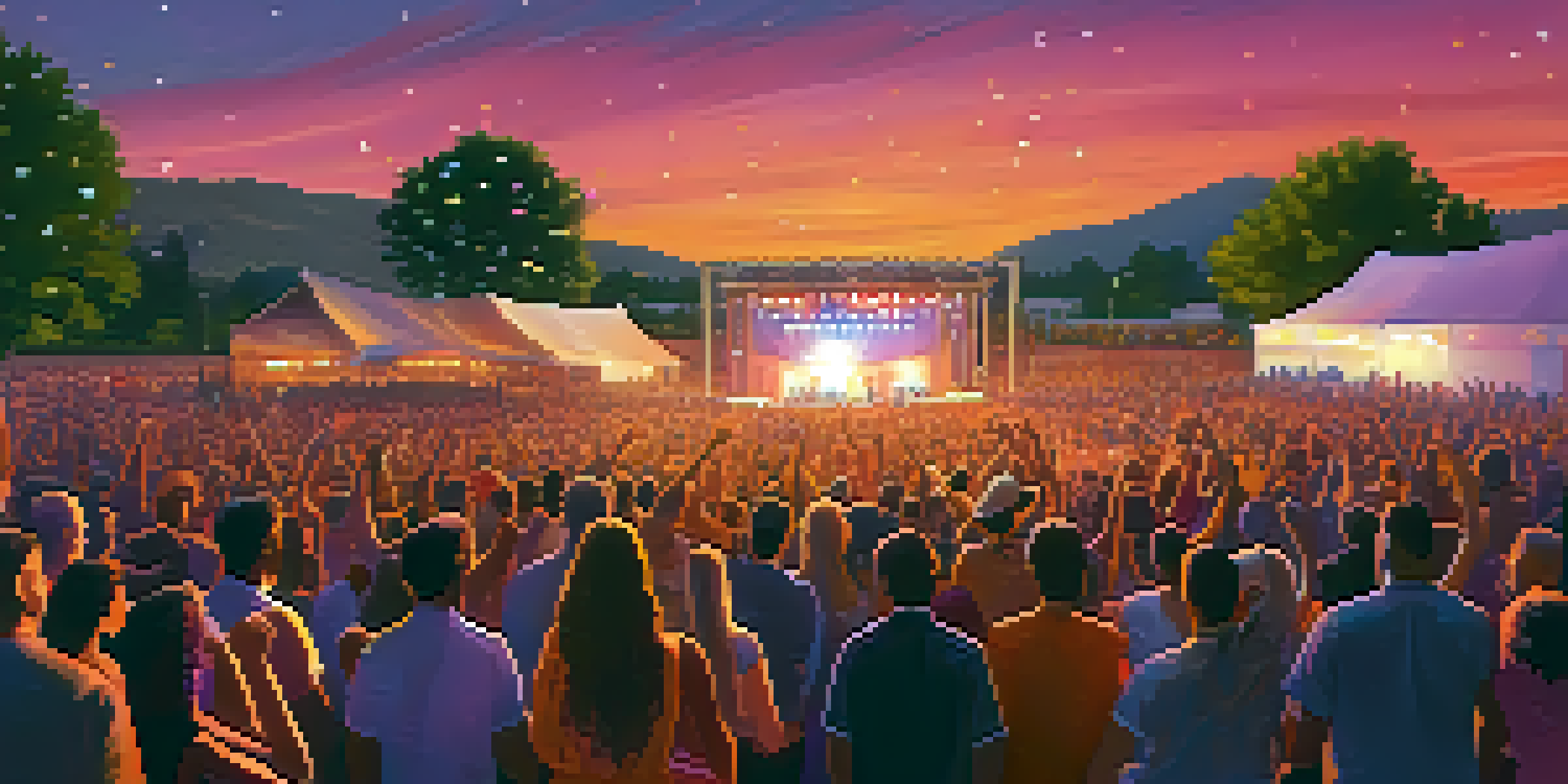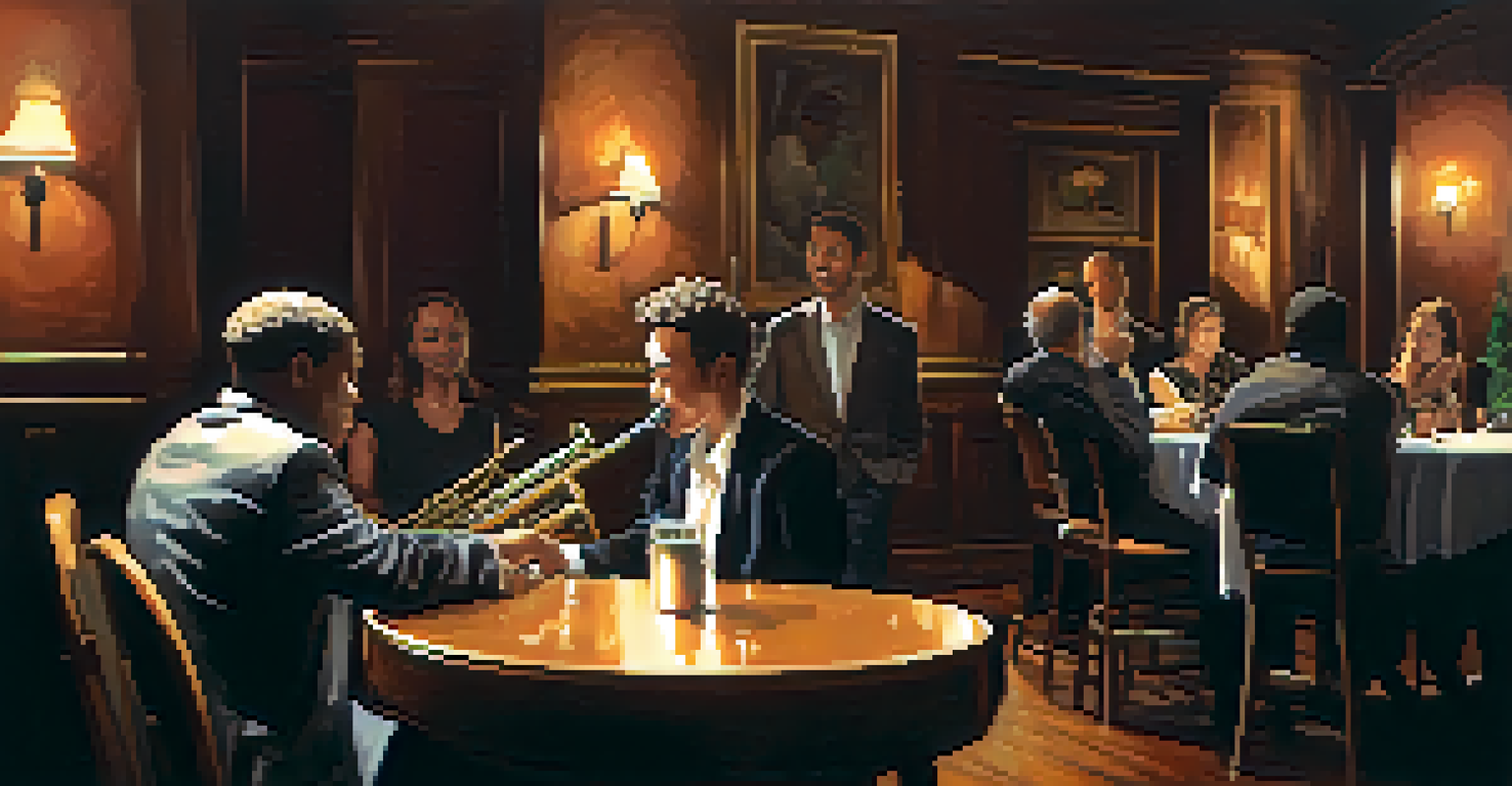The Psychological Effects of Live Music Experiences on Audiences

The Unique Connection Between Music and Emotion
Music has a remarkable ability to evoke emotions, often transporting listeners to different times and places in their lives. When experienced live, this connection can deepen, as the energy of the crowd and the performance creates a powerful atmosphere. Audiences often report feeling a heightened sense of joy or nostalgia during concerts, showcasing how live music taps into our emotional reservoirs.
Music can change the world because it can change people.
This emotional resonance can be attributed to the shared experience of being part of a live audience. The collective energy and enthusiasm can amplify feelings of happiness or excitement, making the experience even more impactful. It's not just the music itself that affects us; it's the environment and the community that comes together in that moment.
For many, attending a live concert becomes a cherished memory, often tied to significant life events. Whether it’s a first date, a reunion with friends, or a celebration, these moments create lasting emotional connections that can be revisited time and again.
The Role of Dopamine in Live Music Experiences
When we listen to music, our brains release dopamine, the 'feel-good' neurotransmitter. This chemical response is amplified in live settings, where the excitement and energy of a performance can create a euphoric experience. As the rhythms pulse through the venue, audiences often feel a rush of happiness and exhilaration, similar to the adrenaline we feel during thrilling activities.

The anticipation leading up to a live show also contributes to this dopamine release. The buildup—choosing outfits, getting tickets, and sharing the experience with friends—creates a sense of excitement that enhances the overall enjoyment of the event. This combination of factors makes live music experiences uniquely rewarding.
Music Evokes Powerful Emotions
Live music experiences can evoke strong emotions, creating cherished memories tied to significant life events.
Moreover, the communal aspect of live concerts reinforces this dopamine effect. Sharing a moment of joy with thousands of others can amplify feelings of happiness, making the experience all the more memorable. It’s a beautiful reminder of how music can unify us, providing a sense of belonging and joy.
The Therapeutic Benefits of Attending Concerts
Attending live music events can serve as a form of therapy for many individuals. The immersive experience allows for emotional release, providing an outlet for stress and anxiety. Whether it’s dancing, singing along, or simply losing oneself in the music, the therapeutic benefits are profound and can lead to feelings of liberation.
Where words fail, music speaks.
Research has shown that engaging with music can lower cortisol levels, the hormone associated with stress. In live settings, this effect is magnified as the audience becomes enveloped in the sound and atmosphere. It's almost as if the music washes away worries, creating a temporary escape from everyday life.
Additionally, the act of participating in live music fosters a sense of community and support. For those dealing with loneliness or depression, being part of a crowd can offer comfort and connection, reminding them they are not alone in their struggles. This shared experience can be incredibly healing.
How Live Music Influences Social Interaction
Live music events are inherently social experiences, offering opportunities for interaction and connection. Whether through spontaneous conversations with fellow attendees or shared moments during the performance, these interactions can enhance our social well-being. Music has a unique ability to break down barriers, making it easier to connect with others.
For many, concerts serve as a catalyst for forming new friendships or strengthening existing ones. Sharing a love for a particular artist or genre can create bonds that last long after the music fades. These connections can be invaluable, particularly in a world where isolation is increasingly common.
Dopamine Boosts Joy at Concerts
The anticipation and energy of live performances lead to increased dopamine release, enhancing feelings of happiness.
Moreover, the sense of community fostered at live events often extends beyond the concert itself. Fans may connect online, discussing their favorite performances or forming groups to attend future shows together. This ongoing interaction can significantly enrich their social lives and create lasting relationships.
The Impact of Live Music on Memory and Recall
Live music experiences are often tied to strong memories, making them easier to recall later on. The sights, sounds, and emotions felt during a concert can create vivid mental snapshots, helping us remember not just the music but also the people and moments tied to that event. This phenomenon is known as 'music-evoked autobiographical memory' and highlights the powerful connection between music and memory.
Many people find that listening to a particular song can transport them back to the exact feelings and experiences of a live performance. This ability to trigger memories can be both joyful and poignant, as certain songs may remind us of significant life events or relationships. This emotional tethering to music makes live performances especially impactful.
Additionally, the shared nature of live music experiences can enhance memory recall. When we experience something with others, those shared moments become a part of our collective memory. This social aspect can make recalling those experiences even more meaningful, as they are intertwined with the connections we’ve formed.
The Effects of Music Genre on Audience Experience
Different music genres elicit varying emotional responses from audiences, influencing their overall experience. For instance, upbeat genres like pop or dance music often lead to feelings of joy and energy, encouraging movement and interaction. In contrast, genres like classical or jazz may promote introspection and relaxation, inviting listeners to immerse themselves in the nuances of the performance.
This genre-specific response highlights how our personal preferences play a role in shaping our live music experiences. A rock concert might energize one person while soothing another, depending on their emotional state and expectations. Understanding these dynamics can enhance our appreciation for the diverse range of live performances available.
Live Music Fosters Social Connections
Attending concerts encourages social interaction, helping to form lasting friendships and a sense of community.
Moreover, the cultural significance of certain genres can also influence audience reactions. For example, folk music often evokes a sense of nostalgia and connection to heritage, while contemporary genres may resonate with themes of modern life. This intersection of music and identity adds a rich layer to the psychological effects of live performances.
The Lasting Impact of Live Music on Mental Well-Being
The positive effects of attending live music events can extend far beyond the concert itself. Many attendees report feeling uplifted and more connected to their emotions in the days or weeks following a performance. This lasting impact can contribute to improved mental health, fostering a sense of happiness and fulfillment.
Engaging with live music can also encourage individuals to seek out more social experiences, leading to a cascade of positive interactions. This newfound motivation to connect with others can create a ripple effect, enhancing overall well-being and life satisfaction. After all, the joy of music often inspires us to share that joy with those around us.

Ultimately, the psychological effects of live music experiences remind us of the profound power of music in our lives. As we continue to navigate our emotional landscapes, these shared moments can serve as guiding lights, illuminating pathways to connection, healing, and happiness.